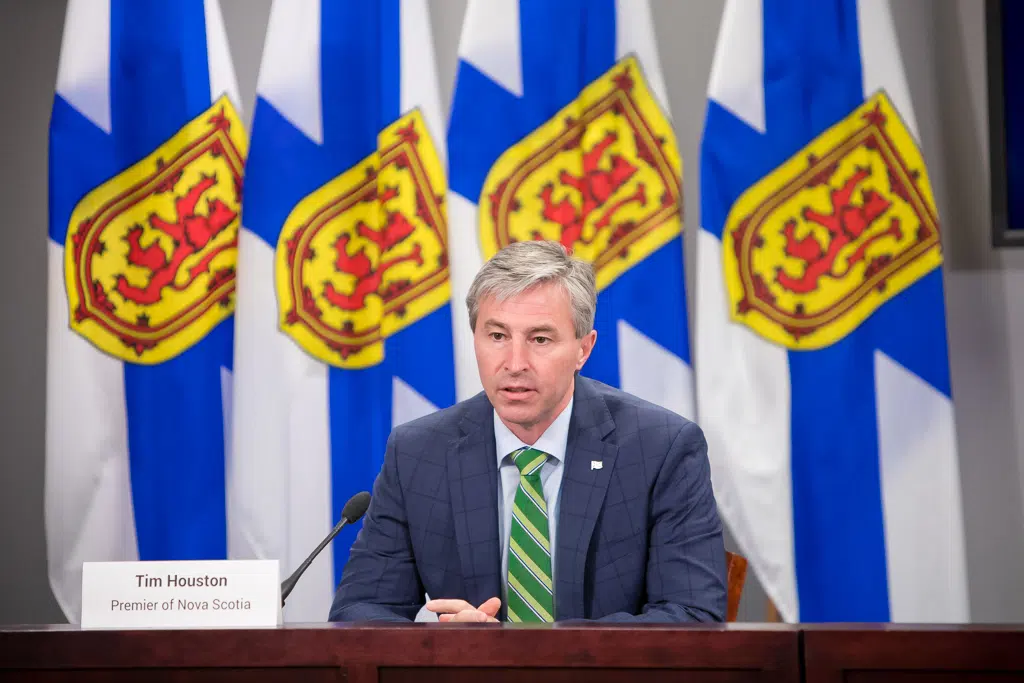Premier Tim Houston is talking the talk, and walking the walk.
Major spending on health care as the Tories unveil their first budget since being elected.
The provincial government will run at least four years of deficits as it tries to follow through on its promise to fix Nova Scotia’s healthcare system. Houston’s PC government is outlining a year of spending that will put the province about $506-million in the hole.
That debt will be spurred largely by spending on healthcare.
Healthcare spending
The province will drop $5.7-billion, or about 45 percent of its total budget for the year, in the healthcare sector. That’s about $413-million more than the last provincial budget.
Significant among its healthcare spending this year is about $66-million to increase pay for continuing care assistants in the province. In February, the government announced a 23 percent raise for all of Nova Scotia’s CCAs, bringing the top salary to $48,419.
The province will also spend about $29-million to maintain the Senior’s Care Grant and another $25-million to establish a direct care staffing standard of at least 4.1 hours of direct care per resident.
Meanwhile, the province will add 500 long-term care beds, on top of the more than 2,000 new or improved beds already being added, at 27 facilities across the province.
This year, the province also plans to add 200 new nursing seats at universities across the province: 28 more at Cape Breton University, 26 more at Dalhousie University, 26 more at St. Francis Xavier University in Antigonish, and 120 more practical nursing seats at Nova Scotia Community College
There are also plan plans to incentivize more doctors to take jobs outside of the HRM, hire more paramedics, and add patient transfer drivers to cut down on the time paramedics waste waiting in hospital.
New Taxes On Non-Resident Homeowners
Nova Scotia’s population has been growing at a record-breaking rate and that continued last year as 9,020 permanent residents arrived.
With the province’s population crossing the 1-million-person threshold and the province committed to bringing in even more people, housing availability has become a concern.
The March 29 budget highlighted the province’s $35-million commitment to support more than 1,000 new affordable housing units
It also plans for another $15-million for affordable housing programs and $2.7 million for new rent supplements.
The province will also begin three projects this year to build new NSCC campuses in Dartmouth and Pictou.
“knowing that more housing options for these students can help alleviate some of the pressure on those communities.”
The province has also introduced two new taxes for people who own homes in Nova Scotia but don’t live in the province.
One, the Non-Resident Deed Transfer Tax, will charge five percent of the value of residential property purchased in the province by any non-resident.
The second, the Non-Resident Property Tax, charges a two percent tax on residential property owned by people who aren’t Nova Scotia residents.
Together, the two new taxes will bring in more than $90-million dollars this year.
Labour Force And Business Development
The province is also promising money to help address pervasive labour shortages, and encourage business development.
The More Opportunities For Skilled Trades program will give significant tax rebates to skilled tradespeople younger than 30. The program is designed to attract more tradespeople to the province and could cost as much as $80-million. However, that cost won’t surface until the 2023/2024 budget year.
The province will also pay $750,000 more for skilled trades in schools programs and $895,000 for six new navigators and four new program officers to support newcomer arrivals and immigration programs.
The province will also shell out about $12-million for a refreshed Innovation Rebate Program, which encourages the private sector to invest in its facilities and green technologies.
It will also spend $2-million for Tourism Nova Scotia to attract visitors to the province and increase tourism revenues.
Four Years Of Deficits
The government expects to bring in $12.7-billion over the 2022/2023 fiscal year and spend $13.2-billion. That’s a revenue increase of $880.1-million, or 7.5 percent, over the 2021-22 budget estimate.
The province predicts it will bring in more money from almost every one of its revenue sources this fiscal year: commercial and income tax, HST, property taxes, fuel tax, equalization payments, and more.
Revenue from cannabis tax is also up significantly as the Nova Scotia Liquor Corporation opens more cannabis stores. Meanwhile, revenue from tobacco tax will be down slightly.
However, its increased spending still leaves it with a deficit.
The province’s $506-million deficit in 2022/2023 will put it back into the red after it ran a small, $107-million surplus last year.
It will also be the first of many deficits the province plans to run until at least 2026. The government is planning for a $418-million deficit in 2023/2024, a $377-million deficit in 2024/2025, and a $294-million deficit in 2024/2025.
That will give the province a $22.9-billion net debt by the end of the 2025/2026 fiscal year.
Opposition Reacts:
The outgoing leaders of the opposition parties commented on today’s budget.
Liberal leader Iain Rankin says with inflation at a 30 year high, there’s no support for Nova Scotians who need it most.
“We don’t see anything right now to help Nova Scotians with cost-of-living prices in our province. We would have liked to have seen some support and some of the monumental spending that they promised go toward that,” says Rankin.
Rankin says healthcare spending is 100 million dollars less than what the Liberals had budgeted last year,
The NDP’s Gary Burrill it falls short around mental health.
“People dealing with depression, anxiety and other mental issues that want to be able to be seen outside of the emergency room, those people have been betrayed and have every right to be disappointed,” says Burrill.
Burrill also says a budget is government’s opportunity to put money where their wealth is, and there is very little rubber hitting very little road.
Premier Houston says he’s proud of today’s budget, the first under his Progressive Conservative government.
Houston says there is help to address inflation.
“We have supports around child tax benefits, and a number of initiatives supporting seniors, We’re doing what we can obviously, with 13.3 billion dollars in spending, all in the name of supporting Nova Scotians,” says Houston.
He says it’s a compassionate and thoughtful budget, and Nova Scotians can be proud of the monumental spending done, especially in healthcare.










